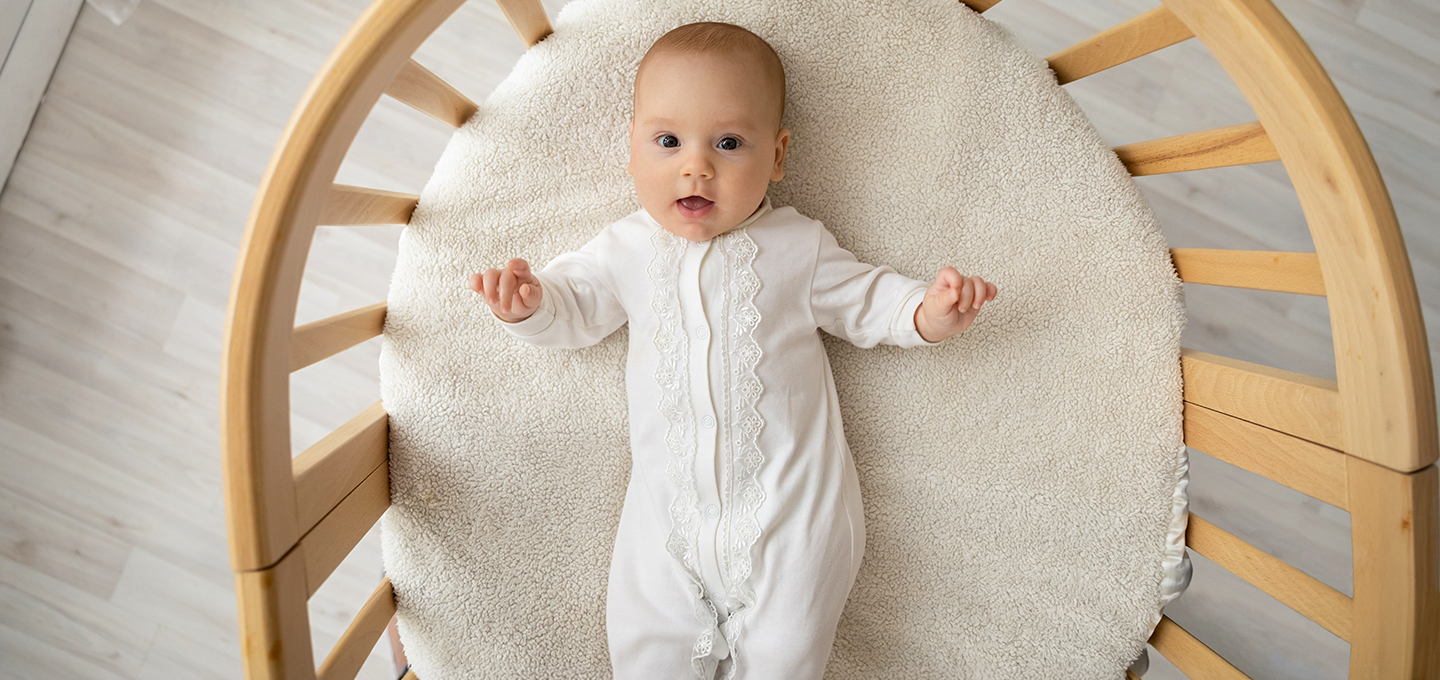
How to Stop Your Baby from Waking Up Too Early


Babies start their day early – there’s no way around it. A baby’s circadian rhythm naturally wakes them between 6 a.m. and 7:30 a.m., and usually the time is consistent. However, if your baby starts consistently waking before 6 a.m., that’ too early. But like with anything baby sleep, an early wake time is likely temporary or can be corrected with a few tweaks to their schedule or environment.
If you’re wondering how to help your baby sleep later in the morning, or how to avoid watching the sunrise each day with your little one, read on for our proven tips on how to stop your baby from waking up too early.
Why Do Babies Wake Up So Early?
A baby’s circadian rhythm naturally wakes them earlier than adults, somewhere between 6 a.m. and 7:30 a.m. is considered normal. Before they turn 4-months-old and their circadian rhythm starts to mature, their sleep schedule is less predictable so they can wake at different times. If your baby is waking up earlier than 6 a.m. there could be a specific reason that can be addressed. Reasons for too early wake ups could include:
The Smart Sleep Coach by Pampers™ app is used by thousands of parents to stop early wake ups and get their baby’s sleep back on track. The app recommends nap times and bedtimes to sync their sleep to their natural rhythm––which helps manage early rising to get your mornings back on track.
What to Do if Your Baby Wakes Up Before 6 a.m.?
If your baby is waking up too early, take this free 3-minute sleep quiz to see what tweaks you can make to their sleep environment or schedule to get them sleeping past sunrise.
Some expert-approved tips to preventing early wake ups may include:
Creating a Dark Sleep Space
If your baby wakes too early, it could be because the early morning sun is shining in their room. To prevent early rising and improve overall sleep quality, invest in blackout curtains and ensure their room is set to the ideal temperature.
Adjusting Naps
If your baby has been waking at a normal time but then suddenly starts waking earlier without any other changes to their routine, they might be getting too much sleep during the day. If this happens, it may be time to drop a nap, or at least shorten the afternoon nap to extend their wake window before bed.
Tracking Wake Windows
The periods between sleeps are known as wake windows. If your baby stays awake longer than their recommended wake window, they may become overtired, which can lead to early wakeups. To maintain healthy sleep patterns and prevent early rising, track their wake windows in the Smart Sleep Coach app. The Smart Schedule will notify you when it’s time to put your baby to sleep so they fall asleep faster––and stay asleep longer––and auto-adjust to make sure you never miss a wake window.
Opting for an Earlier Bedtime
Unlike adults, putting your baby to bed later likely will not help them sleep longer in the morning. In fact, it can make them overtired and cause them to wake up even earlier. An earlier bedtime helps you catch up on sleep and reset the internal sleep clock.
Make “Good Morning” Stand Out
If your baby wakes up early and you enter their room, treat it as a night waking: keep the lights low, speak softly, and avoid cuddling. Reserve your happy, joyful, energetic “good morning” and morning routine for the usual wake time. Even if your baby wakes at 5:50 a.m., save the official “good morning” for at 6:00 a.m. This helps your baby understand that an earlier wakeup isn’t the official start of the day, which can help correct early rising.
Dream Feeding
If your baby is still feeding during the night, consider a dream feed to prevent early morning wake ups. This involves gently rousing your baby and feeding them while they’re drowsy. If your baby is hungry, they will latch on without fully waking up. If they don’t latch, put them back in their crib. Dream feeding can help your baby sleep longer in the morning.
Bonus Tip for Toddlers and Preschoolers
If your toddler or preschooler wakes up too early, try using a wake clock that shows them with colors or shapes (such as the sun and moon) when it's time to wake up and when it's time to sleep. Visual cues can help them understand and stick to their sleep schedule.
How Long Will Early Wakeups Last?
Remember, early rising for your baby is normal, natural, and often temporary. While it can be tiring, especially if you’re getting up early with your baby, it’s also a sign that your baby is growing, developing, and figuring out their natural sleep rhythm. The key to stopping your baby from waking up too early in the morning, as with all aspects of sleep training, is consistency and patience. Tracking your baby’s wake windows in the Smart Sleep Coach and following its sleep schedule recommendations is a great first step to stopping early wakeups. Sleep training your baby can also help your baby start sleeping to the desired time. Some sleep training methods can work faster to solve early wakeups.
FAQS AT A GLANCE
Once your baby’s circadian rhythm starts to develop, it’s normal for them to wake up between 6 a.m. and 7:30 a.m. This is when their bodies naturally wake. Before their circadian rhythm matures, your baby is not on a set schedule so can wake up even earlier. If your baby is overtired or their schedule is not optimized to their natural rhythms, they could wake up even earlier than 6 a.m. Luckily there are ways to get their sleep back on track!
Bottom Line
It’s exhausting when your baby wakes up before 6 a.m., but remember, as with all things baby sleep, early wake ups are likely temporary––and solvable!
If you’re struggling with early wakeups, try first tracking your baby’s wake windows using the Smart Sleep Coach app and see if small tweaks to their schedule can realign their sleep cycles. Other changes to their sleep environment can also help. More formal sleep training can be another quicker option to help your baby sleep later or get on a structured sleep schedule.
- American Academy of Pediatrics. Caring for Your Baby and Young Child: Birth to Age 5, 7th ed. (New York: Bantam Books, 2019).
- American Journal of Respiratory and Critical Care Medicine, “Obstructive Sleep Apnea in Infants”
- Journal of Pediatrics and Child Health, “The sleep patterns of infants and young children with gastro-oesophageal reflux”









